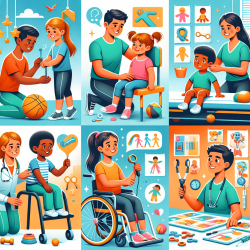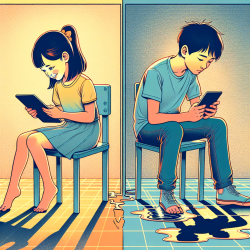Introduction
As a practitioner in the field of speech-language pathology, physical therapy, or occupational therapy, the goal is always to provide the best possible outcomes for children with cerebral palsy (CP). A recent study, "Single-centre parental survey of paediatric rehabilitation services for children with cerebral palsy," sheds light on the current state of rehabilitation services and offers insights into how we can improve our practices to better serve this population.
Understanding the Current Dosage of Rehabilitation Services
The study surveyed 96 children with CP, aged 2-8 years, to determine the frequency, intensity, time, and type of rehabilitation services they received. The results revealed that children with CP typically received between 0.9 and 1.2 hours per month of each therapy discipline (PT, OT, SL/P) in educational settings and 1.5 to 2.0 hours per month in clinical settings. This frequency was most commonly weekly, regardless of the setting or discipline.
However, these figures fall short of the recommended 14-25 hours of goal-directed rehabilitation needed to achieve individual goals and 30-40 hours for noticeable changes in motor abilities. This discrepancy suggests that children with CP may be under-dosed in their rehabilitation therapies, potentially limiting their progress.
Implications for Practitioners
For practitioners, these findings highlight the need to reassess the dosage of therapy services provided to children with CP. Here are some actionable steps to consider:
- Evaluate Current Practices: Review the current frequency and duration of therapy sessions provided to your clients. Are they aligned with the evidence-based recommendations for effective rehabilitation?
- Advocate for Increased Dosage: Work with educational and clinical institutions to advocate for increased therapy hours. Highlight the importance of adequate dosage in achieving meaningful outcomes.
- Implement Home Programs: Encourage families to participate in home-based programs that complement clinical therapy. Provide clear guidelines and support to ensure these programs are effective and manageable for caregivers.
- Monitor Progress: Regularly assess the progress of children with CP to ensure that therapy goals are being met. Adjust therapy plans as needed to optimize outcomes.
Encouraging Further Research
While the study provides valuable insights, it also underscores the need for further research. Future studies should explore:
- The effectiveness of different therapy dosages in achieving specific outcomes.
- The role of family involvement in home-based programs and its impact on therapy success.
- Strategies for implementing evidence-based therapy dosages in various settings.
Conclusion
As practitioners dedicated to improving the lives of children with CP, it is crucial to stay informed about the latest research and apply these findings to our practice. By optimizing therapy dosages and exploring new avenues for research, we can enhance the quality of care and outcomes for our clients.
To read the original research paper, please follow this link: Single-centre parental survey of paediatric rehabilitation services for children with cerebral palsy.










